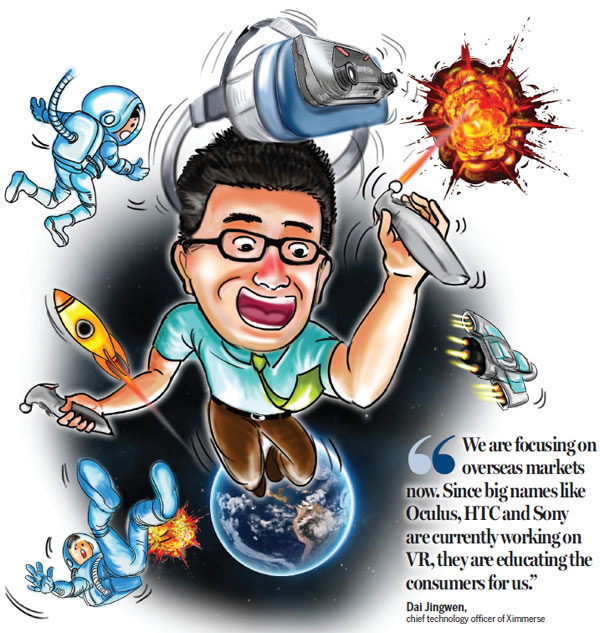Buzzing into a $30-billion world of virtual reality
Updated: 2016-05-12 07:50
By Deng Yanzi in Shenzhen(HK Edition)
|
|||||||

Editor's note: With a VR (virtual reality) market on the mainland still very much in its infancy and remains an expensive form of entertainment, a Guangzhou startup has dedicated itself to coaching industry players.
As virtual reality (VR) becomes the latest buzzword in technology, tech companies on the Chinese mainland are also roaring on the scene with their offerings, mostly output devices such as headsets.
Guangzhou-based startup Ximmerse takes a different approach to rise above the crowd.
The company's VR input devices, including stereo cameras and joysticks, aim to achieve motion detection and interaction in the simulated world.
While the Ximmerse joystick makes actions such as touching or picking up an object possible, their stereo camera that's attached to a VR headset can detect the motion and gesture according to the LED light on the joysticks.
The Ximmerse devices work with mobile-based VR headsets such as Gear VR by Samsung.
The company banks on the portability of mobile VR headsets, powered by smartphones, to propel wider adoption of the technology.
"For a new idea to come alive, it has to be 'mobile'," says Dai Jingwen, chief technology officer of Ximmerse.
"People can use their fragmented time, when they are on the subway or waiting for a bus, to put on their mobile headsets and enjoy the VR experience," he explains.
Dai, former head of a Lenovo laboratory in Hong Kong with a PhD in computer vision, is one of the co-founders of Ximmerse, along with VR enthusiasts and tech veterans Davy He Jie, Wu Bian and Mike Bailey.
Founded in December 2014, the VR startup is now 30-strong with offices in Guangzhou, Shenzhen and Los Angeles in the US. Ximmerse was recently funded by US telecommunications firm Qualcomm.

Despite the immense market opportunities on the Chinese mainland, the country's VR market is still too nascent to warrant Ximmerse's full attention at the moment.
"The VR market in China is just taking off and consumers need to be educated," Dai says. "Therefore, we are focusing on overseas markets now. Since big names like Oculus, HTC and Sony are currently working on VR, they are educating the consumers for us."
Besides the US, Ximmerse made its debut in Europe last month at the VR World Congress in the Bristol and Bath region of the UK, which is considered the European capital for VR.
The world is waiting for VR to eventually become the reality, but industry insiders hope to remind people that the industry is still in its infancy.
"In reality, we are still at the very, very beginning," Dan Page, director of the VR World Congress, tells China Daily.
"VR is still very new, and is still an expensive form of entertainment. This makes consumers cautious about where they spend their money, so brands like Samsung, Sony, HTC or Facebook/Oculus have the advantage for now."
He believes that as prices fall, and as Chinese VR brands get more recognition, startups such as Ximmerse will have a better chance in competing with the big names in the field.
As enthusiam for VR technlogy comes mainly from the gaming community at present, Page expects the application of VR to move beyond gaming to achieve broader adoption.
"Very soon, we'll also see many more practical applications for VR in engineering, training, science, medicine and so on. A lot of the work in these areas has been kept under wraps due to non-disclosure agreements, but they are increasingly becoming public knowledge," he says.
According to California-based technology advisor Digi-Capital, the VR ecosystem is projected to be worth $30 billion by 2020.
By the end of 2025, more than 135.6 million VR headsets will be in use, and 122 million of them will be mobile devices, according to a report jointly released by VR business intelligence firm Greenlight VR and industry news publication Road to VR.
The report also points out that although sales of VR hardware devices are expected to reach 2 million units by the end of this year, it will probably take between six and eight years for the technology to become truly mainstream.
"We believe mainstream adoption of (VR gear) will be accelerated by the development of a 'killer consumer app', which will likely come from social networking in virtual reality," according to the report.
Dai says he expects the future of VR to be social.
"Gaming may serve as ground zero for virtual reality to take off, but the need for VR games isn't strong yet", he explains, adding that social networking has now become a necessity as people are constantly checking social media on their smartphones.
"Gaming is not the future of virtual reality. The future is to be social," Dai predicts.
Ximmerse plans to release its third-generation devices of a smaller size and improved functionality by late July this year.
iris@chinadailyhk.com
(HK Edition 05/12/2016 page7)